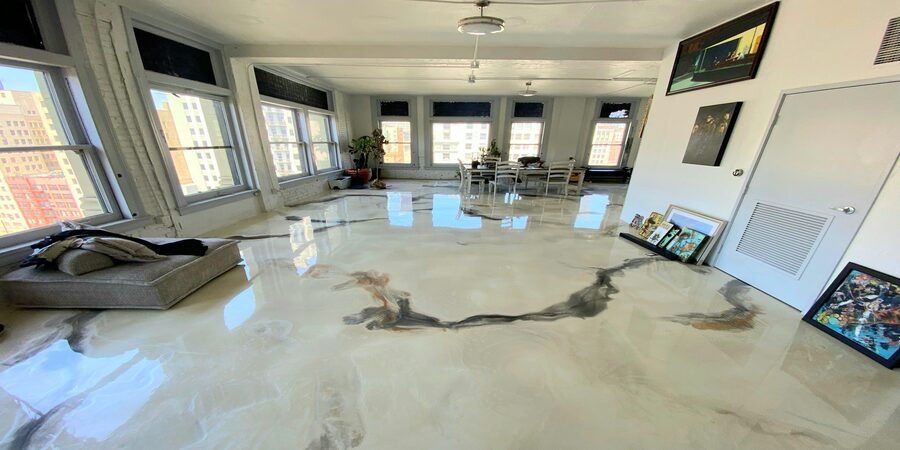Epoxy flooring has gained immense popularity in recent years due to its durability, versatility, and aesthetic appeal. Whether you’re considering epoxy flooring for your home or business, choosing the right type can be a daunting task.
There are several factors to consider, such as budget, traffic level, and desired look. In this article, we will guide you through the process of selecting the perfect epoxy flooring for your specific needs.
Determine your budget
Before diving into the world of epoxy flooring, it’s crucial to establish your budget. Epoxy flooring options can vary significantly in terms of cost, so having a clear budget will help narrow your choices. Keep in mind that while epoxy flooring may require a higher upfront investment, it is a long-term investment that can save you money on maintenance and replacement costs in the future.
Assess the traffic level
The next step in choosing the right epoxy flooring is to evaluate the level of foot or vehicle traffic in the area where the flooring will be installed. Different epoxy coatings have different levels of durability and can withstand varying amounts of wear and tear. For high-traffic areas, such as commercial spaces or industrial facilities, choosing a heavy-duty epoxy coating that can handle constant use without showing signs of deterioration is essential. On the other hand, for residential spaces with lighter foot traffic, a standard epoxy coating may be sufficient.
Consider the desired look
Epoxy flooring offers a wide range of design options, allowing you to customize the appearance of your floors according to your preferences. Consider the overall style and ambiance you want to create in your space. Do you prefer a sleek, modern look or a more natural and rustic aesthetic? Epoxy coatings come in various colors, patterns, and finishes, including metallic, solid, flake, and terrazzo effects. Take the time to explore different design options and visualize how they would complement your existing decor.
Evaluate the substrate condition:
The condition of the substrate, or the surface on which the epoxy flooring will be applied, plays a crucial role in determining the type of epoxy system suitable for your needs. If you have a new concrete slab, it is important to ensure it is fully cured and free from any moisture issues. In the case of an existing floor, it might require repairs or preparation work before the epoxy can be applied. Consulting with a professional epoxy flooring installer can help you assess the substrate condition and determine the appropriate steps to take.
Understand the different types of epoxy flooring
To make an informed decision, it’s important to familiarize yourself with the different types of epoxy flooring available. Here are some common options:
- Solvent-based epoxy: This traditional epoxy system offers excellent durability and chemical resistance. It is suitable for heavy-duty industrial applications but can emit strong odors during installation.
- Water-based epoxy: This eco-friendly option is low in volatile organic compounds (VOCs) and has a milder odor compared to solvent-based epoxy. It is popular for residential applications, such as garages and basements.
- Self-leveling epoxy: Ideal for areas with uneven or damaged floors, self-leveling epoxy creates a smooth and seamless surface. It is commonly used in commercial and industrial settings.
- Epoxy mortar systems: These systems combine epoxy resin with graded aggregates to create highly durable and impact-resistant flooring. They are commonly used in areas prone to heavy impacts or frequent cleaning, such as commercial kitchens or food processing facilities.
- Decorative epoxy coatings: If aesthetics are a priority, decorative epoxy coatings offer a wide range of design possibilities. They can incorporate color flakes and metallic pigments or even create the appearance of natural stone or terrazzo.
Seek professional guidance
Choosing the right epoxy flooring for your specific needs can be complex. Seeking professional guidance from an experienced epoxy flooring installer is highly recommended. They can provide valuable insights, assess your requirements, and recommend the most suitable epoxy system for your space. Professionals also have the expertise to prepare the substrate and ensure a flawless installation properly.
Maintenance requirements
It’s important to consider the maintenance requirements of the epoxy flooring system you choose. While epoxy flooring is known for its durability, regular maintenance is still necessary to keep it looking its best. Some epoxy coatings may require occasional resealing or waxing to maintain their shine and protective properties. Understanding the maintenance needs will help you plan for long-term care and ensure the longevity of your epoxy flooring.
Choosing the right epoxy flooring for your home or business involves carefully considering various factors, including a budget, traffic level, desired look, substrate condition, and maintenance requirements,
By understanding your specific needs and consulting with professionals, you can make an informed decision and enjoy the benefits of a durable, attractive, and long-lasting epoxy flooring system.
Remember, investing in the right epoxy flooring is an investment in the beauty and functionality of your space for years to come.
Key Takeaways:
- Establish a clear budget before selecting epoxy flooring to narrow down your options.
- Evaluate the traffic level in the area where the flooring will be installed to determine the durability required.
- Consider the desired look and design options available, such as color, pattern, and finish.
- Assess the condition of the substrate to determine if any repairs or preparation work is necessary.
- Familiarize yourself with different types of epoxy flooring, such as solvent-based, water-based, self-leveling, epoxy mortar systems, and decorative coatings.
- Seek professional guidance from an experienced epoxy flooring installer for expert advice and recommendations.
- Understand the maintenance requirements of the chosen epoxy flooring system for long-term care and durability.

